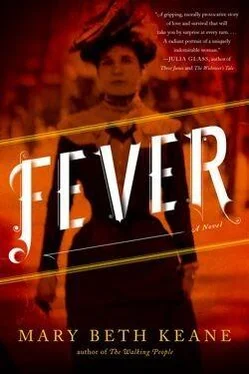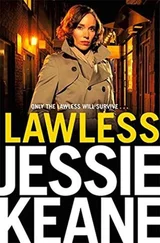“You saw the size of the boat. And they run it only if there’s people to take it. Do you think it would work?”
Alfred was silent, brooding over something.
“Besides, I don’t want to work under another name. I haven’t done a thing wrong. I should be allowed to work under my own name. Mr. O’Neill says he’s making progress, and…”
“Mary—”
“… there are men who’ve done the same as I’m accused of and they’re walking free—”
“I have to tell you something.”
Alfred walked to the water’s edge, picked up a stone, and threw it.
So this was it, Mary thought, this, whatever this was, this was the thing that had driven him uptown and across Hell Gate to see her. He kept his back to her, and she remained silent. She would not make it easier by drawing it out of him.
“I wanted to tell you when you were kept at that hotel, but then they wouldn’t let me see you, and I didn’t want to tell you during the hearing because I was afraid you’d make a scene and hurt your case, so this is better, really, this way, alone here. I think it’s best anyway.”
“Why would I make a scene?” Whatever it was, she would not make a scene in this spot, the only peaceful place she’d discovered on the entire island.
“You’ve been gone for more than two years now…”
Mary put her hands to her head and her chin to her knees. She knew it. She damned well knew it. She knew it, and she didn’t know she knew it.
“… and most of the papers say they’re never letting you off this island.”
Mary stood up from the log, brushed off the back of her skirt, and headed up the path. He took a few quick steps after her and caught her arm.
“Like I told you, I couldn’t afford the Thirty-Third Street rooms, so I took a bed at the Meaneys’.”
“Oh, yes! The happy Meaneys and their son Samuel, for whom you like to set a good example.”
“For whom Mrs. Meaney forced me to set a good example. After a week there she said I could stay on only if I stopped drinking.”
“And yet you’re still there.”
“I did the Oppenheimer Treatment. I’m still doing it. Her husband did it and it worked for him and she thought it might work for me.”
“It’s bogus. Everyone knows it’s bogus. They take your money and you drink the quinine until you’re so sick you can’t take a sip of anything, and then the cure is telling you not to drink. Then the day you stop the quinine it doesn’t work anymore. The husband is still not drinking?”
“The husband is dead.”
Mary squatted on the path, touched her fingertips to the ground to steady herself. That was it. She almost smiled. She’d felt it between them when she saw him in New York, but she couldn’t put a name on it. Now she could. Alfred remained standing.
“How long dead?”
“About five years now.”
Mary felt her stomach lurch. “You said the Meaneys might let me stay with you there until we found our own place. You said you’d ask. When you spoke of them you said ‘They’ and implied a mister and a missus.”
“I did.”
“Why?”
“I”—Alfred leaned against a tree—“I just thought I’d explain it all later, away from all those people. Or I thought maybe I’d leave the Meaneys that afternoon once you got free and we’d get our own place again. I hadn’t decided. I was still deciding. Liza is not as strong as you are. I’d have to be very careful about it.”
“And now you’ve decided.”
“I wasn’t given a choice! Those judges decided! What am I to do, Mary? Live like a monk for the rest of my life? You know I love you. And as God is my witness, to this day I’ve never met anyone like you, but I thought there were things we understood about each other. And there’s the boy. He’s a good boy, a smart boy. He—”
Mary held up her hand. “I don’t care one fiddle about that boy, or about delicate Liza.” She itched to slap him, but it would hurt him more if she didn’t care. She felt her lungs heaving, her blood moving just under the surface of her skin, but instead of taking a stick and beating him, instead of unleashing the long string of words that had lined up, she simply walked away. At the top of the path, at the point where John had to get on his knees with his scythe and clear the brambles and thorns, she turned around.
“I have only one question, and I want you to tell me the truth.” She would not cry. She would not let her voice waver. “I begged you to stop drinking. I hauled you up all those stairs. I gave you money when you couldn’t work. I shaved you. I cut your hair. Do you know how good things would have been if you hadn’t been drinking? Remember how good those stretches were when you didn’t drink? Do you remember?”
“I remember. Of course I remember.” He stepped toward her, and she stepped back.
“So why, when Liza Meaney asked, did you march yourself straight to the doctor’s office for the Oppenheimer cure?” Mary felt the pin curls loosen from the bun where she’d gathered them. She felt how lank and pathetic each tendril was that hung about her face.
“I don’t know. I do know that I love you, Mary. As much as always. And I could never love her like I love you.”
“You can love her as much as you like, Alfred.”
“Wait.” Alfred grabbed her elbow, and she spun, turned on him ready to fight if he came any closer. “There’s one more thing.”
“What’s that?
“And just know before I tell you that it’s because of the boy. He’s still young, and it’s only—”
Mary laughed. She tipped back her head and laughed. She laughed at the birds, at the tops of the trees, at the waves, at the furious, roiling Hell Gate, at the sound of the foghorn in the distance, at the thought of John Cane hurrying with her plate, at the doctors, at the nurses, at their needles, their test tubes, their glass collection canisters. She laughed at her own stupidity, and at the stupidity of all the fools working and living and breathing over in Manhattan. She laughed at herself, for ever having been sorry to have left it.
“You’ve asked her to marry you.”
“And she’s said yes.”
• • •
After he left, after she watched the ferry pull away from the dock and churn west, Mary went back to her spot by the water. Her snowy egret had not shown itself while Alfred was there, and stayed hidden now. She hugged her knees, feeling the hollow place that laugh had bubbled forth from earlier. If there was something funny in what he’d told her, she could no longer see it.
After a while, she realized it was getting dark, and it had started to rain again. The loose sand that met with the tree line was pressed down by the drops, and then it was pouring, the drops hitting the river so hard that the surface of the water jumped and frothed, and she hoped if his ferry had not reached the other side yet that it would fill up with this angry weather and sink. And then she hoped it wouldn’t.
Late, long after the supper hour, long after the island had gone dark, she saw electric torches approaching from the small wooded divide that separated her from the hospital. She heard voices on John’s path.
Two nurses approached her and put their umbrellas together to cover her as they walked her back. “What are you thinking, Mary?” the one asked. “What are you doing?”
The other said, “You’ll make yourself sick.”
“How are you doing, Mary?” Mr. O’Neill asked.
It was the fourth day of February 1910, their second face-to-face meeting since the disappointment of the hearing the previous summer. It was unseasonably warm, and instead of meeting in Mary’s bungalow, or in one of the meeting rooms of the hospital, Mr. O’Neill suggested they sit at one of the new picnic tables at the Tuberculosis Pavilion and take in the fresh air. So far, Mary had not seen anyone else use the new tables, and said so to Mr. O’Neill. “Even better,” he said. “We’ll be first.” He wanted her to be outside when he told her the news. He wanted her to be able to whoop and shout and dance. He wanted her to be able to celebrate in full view of all those hospital windows looking down on them from above, all those eyes behind the windows, observing, trying to guess what was going on. Hers was the longest case he’d ever worked on, and at home, over the weekend, his wife had already invited their friends to open bottles of champagne and toast him.
Читать дальше












